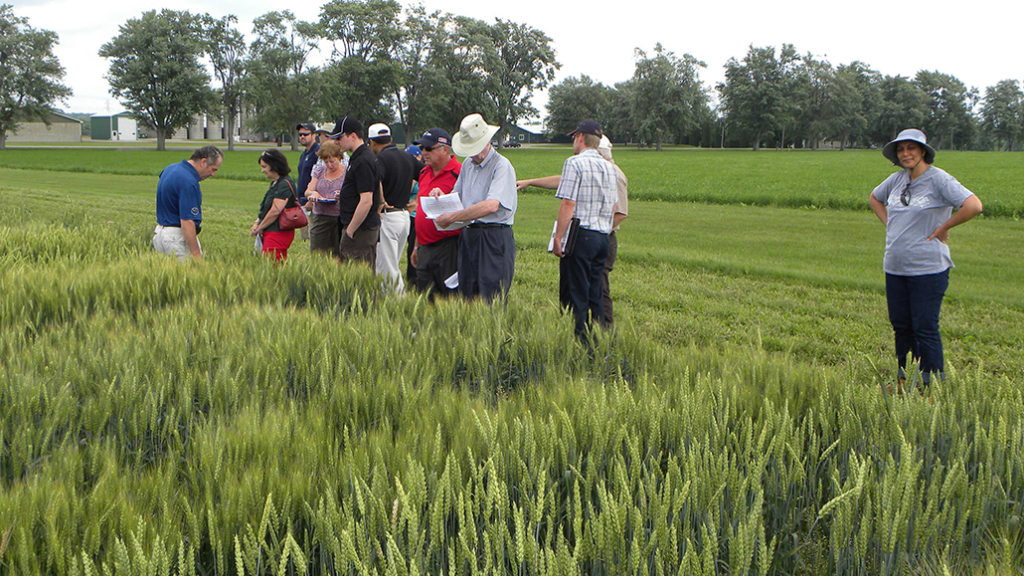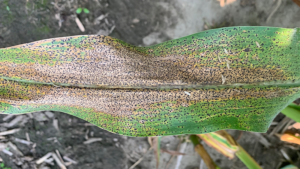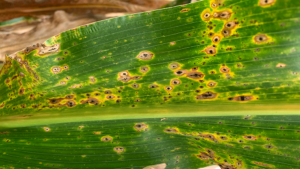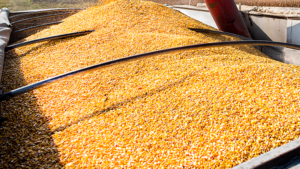Dedicated industry champion retires
DAVID MORRIS — A LEGACY IN FIELD CROP EXTENSION

WHEN IT COMES to witnessing advancements in Ontario field crops, David Morris has had a front-row seat. But he wasn’t a bystander. Morris is one of the longest-serving secretaries on the Ontario cereals and corn committees — two organizations dedicated to the performance testing of hybrids and varieties to help growers make the best seed decisions for their farms.
With a tenure that spans more than 25 years, Morris recently retired from the Ontario Cereals Crop Committee (OCCC) and Ontario Corn Committee (OCC) in November 2021. Often working in a supporting role, Morris’ dedication to extension and disseminating valuable information to help provincial growers grow their best crops are his legacy.
“I have great memories of touring the province to inspect OCC trials with Dave,” says Greg Stewart, agronomy lead with Maizex and long-time OCC member. “Dave’s unique advantage was that he had a full understanding of the past and an eye to the future.”
Over the years, the roles of the cereal and corn committees have evolved, but the purpose remains the same — to support the provincial field crop sector by coordinating performance testing and disseminating research results to Ontario growers. The OCCC is also responsible for recommending cereal variety registration, a service the OCC provided until 1996, when corn hybrid licensing was discontinued.
EARLY DAYS
Morris says he was always interested in research and extension. After graduating with a master’s in crop science from the University of Guelph, he started his career in extension as an assistant ag rep in Brant County with the Ontario Ministry of Agriculture and Food (OMAF) in 1975. After gaining experience, Morris moved to the OMAF Soils and Crops Branch with territories across southwestern Ontario. “I met plenty of interesting people and learned a lot about a variety of field crops,” he says. “My job was to update growers with the latest information and help them solve crop production problems.”
One of his responsibilities was representing OMAF on research committees, and in 1979 Morris joined the OCC. At the time, the committee was still involved in registering corn hybrids, testing and evaluating performance trials. Morris joined the Publications Committee that produced the results for growers to reference when making seed selections, and the Deletions Committee that oversaw removing hybrids from the recommended list. Over time, Morris moved through the committee, becoming chair in the mid-1980s and secretary in 1989. He took a short break from the committee when he changed careers in the early 1990s, resuming his role as secretary in 1997.
“I saw a lot of changes in the corn industry during that time,” says Morris. “Like the removal of the registration requirements for corn that allowed Ontario growers to access the latest genetics faster. It was a good thing, but it also changed how the committee worked and our contributions to the industry.”
In 2009, Morris was approached by the Ontario Forage Crops Committee to be their secretary and, again in 2012, he was asked to serve as secretary to the OCCC. “There was a time when I was working with three crop organizations, all serving an important purpose to conduct research and share the results with producers,” says Morris.
“David always worked behind the scenes, coaching committee chairs, keeping meetings running and providing the necessary institutional knowledge of the OCC,” says Marty Vermey, Grain Farmers of Ontario senior agronomist. “He will be missed.”
MAKING A DIFFERENCE
“David was a valued member of the OCCC over the last 10 years. His contribution to the Ontario cereal industry and the committee by keeping minutes, revising guidelines, and many other committee tasks of generally keeping us all on the straight and narrow is very much appreciated,” says Ellen Sparry, general manager of C&M Seeds and OCCC winter wheat registration coordinator. “We will miss having David at the OCCC meeting table, but wish him all the best.”
In addition to supporting the crop committees, Morris harnessed his interest in extension and knowledge transfer by collecting, writing, and disseminating the latest crop production information for growers. He embraced the early days of the internet in the 1990s by combing the web for the latest information to share with Ontario corn growers via a website hosted by the Ontario Corn Producers’ Association. Morris explains that, at the time when the internet was still new and access to information wasn’t as easy as it is today, growers appreciated the in-depth analysis and general advisory of the information that was provided. Topics included soil conservation and tillage, seed genetics, and improving crop protection application safety. Morris contributed to the Ontario Corn Producer magazine and co-authored several OMAF resources based on the information collected from the OCC, other provincial research committees, and personal experience.
“I think one of the greatest highlights of my career was being involved in creating resources and seeing the impact they have had on crop production practices,” says Morris. “For example, the various soil conservation and land stewardship programs that I was involved in, along with many other OMAF staff, helped shift grower acceptance and adoption of practices like conservation tillage and no-till planting.”
While the roles of the OCC and OCCC evolved during Morris’ involvement, one thing remained the same – providing reliable, independent data about the performance of cereal and corn varieties and hybrids to help growers make the most informed decision for their farms.
“These groups continue to make worldwide contributions every year with their field trials and published results,” explains Morris, noting the results of more than 200 corn hybrids can now be found in today’s Hybrid Corn Performance Trials Report. The field trial results also help ensure new varieties, especially cereal varieties, have a market based on their performance. “The OCC has the reputation of conducting some of the best corn performance trials in North America.”
Morris says, “the most enjoyable part of my role was working directly with growers, members of the committee and travelling the province every fall to tour the performance trials.” He enjoyed making long-term industry connections and supporting board members to advance the cereal and corn industries year after year. “David had a great blend of wanting to get things done right and was more than willing to work with people’s abilities and constraints,” says Stewart.
Matthew Czerwinski, Grain Farmers of Ontario research lead and current chair of the OCCC agrees. “David makes people on the board look good.”
Morris has dedicated his career to Ontario’s field crop industry. He’s proud to have had an instrumental role in the ongoing evolution of field trials, information extension and progressive farming practices. Thank you for your service to Ontario grain farmers, David. •




















